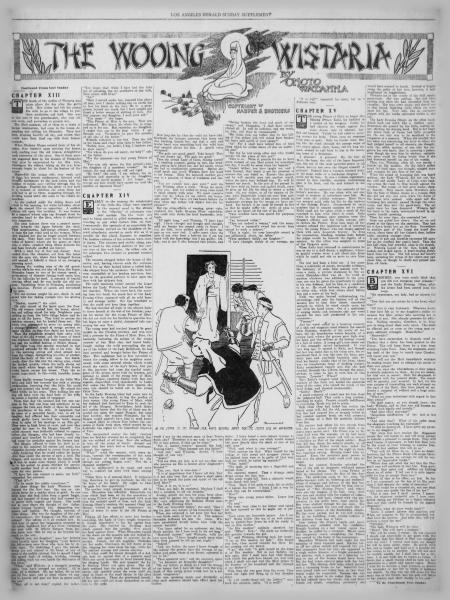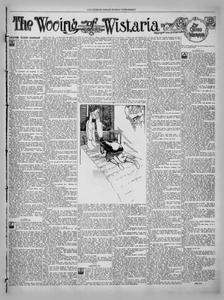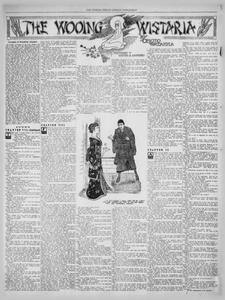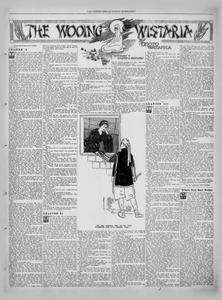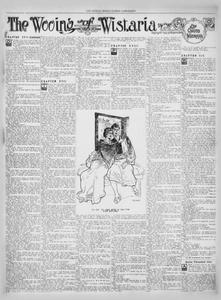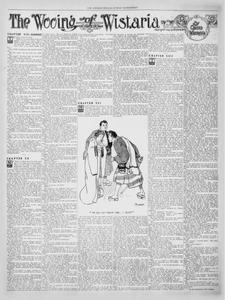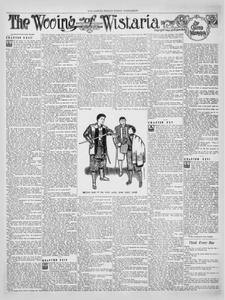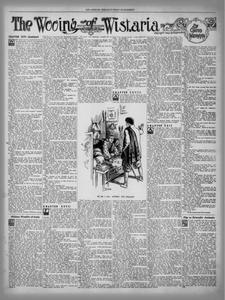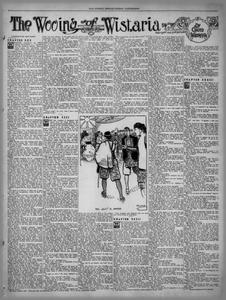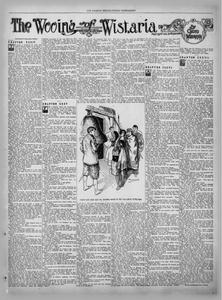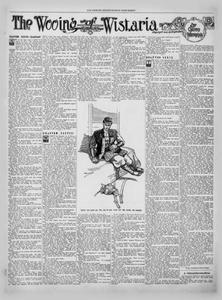Chapter XIII
The death of the mother of Wistaria had taken place the day after the girl’s birth. Her father had left his young Eta wife to go to the village to purchase medicines and food. She was in the care of her grandmother, who was old and weak, and powerless to protect her.
The Mori samurai, all of them in a state of savage intoxication, had come to the house demanding and calling for Shimadzu. They had been drinking heavily all day, and swore they would have their final cup with their former comrade.
When Madame Mume assured them of his absence, they insisted upon entering the house, and, pushing past the old woman, straightway took possession of the place. One of their number suggested that in the absence of Shimadzu they must be entertained by his Eta wife, whereupon the others, taking up the cry, boisterously began to shout for the hostess of the house.
Meanwhile the young wife, very weak and ill from her recent confinement, listened with feverish excitement to the loud voices and the bedlam of noises now rattling through the little cottage. Fearful for the safety of her lord, in a moment of delirium she arose from her sick bed to go to them, staggering through the dividing rooms until she came to the ribald debauchees.
As she pushed aside the sliding doors and stood in the opening, her white bed-robes about her, she seemed like an apparition. A sudden silence fell upon the revellers. It was broken by a samurai whose sake cup dropped from his nerveless hand to the floor, where it shattered into fragments.
The next instant there was a general movement towards the figure between the shoji. That simultaneous, half-savage advance seemed to snap the last vital cord in the woman. When they reached her she no longer swayed between the shoji. They bent over her in various attitudes of horror, where she lay prone at their feet, a white, crushed thing whose delicate life had been brutally snuffed out forever.
With a loud cry of fear and dismay they rushed from the chamber, out from the house into the open air, where their befogged brains still seemed to behold a vision of an avenging pursuing spirit.
Hearing the wailing cries of the old grandmother while he was yet afar off from the house, Shimadzu began to run at his utmost speed, a premonition of disaster forcing itself upon him. Up the hillocks he sped. A moment of fearful striving effort and he was beside the old woman. Something froze in Shimadzu, paralyzing his faculties. Power of speech and movement was gone.
The old woman caught his arm, shook it, and gazed with her fading eyesight into his staring eyes.
“Master, master!” she cried.
He only stared at the figure upon the floor. The old woman rushed from the house, shrieking and calling aloud for help. Neighbors came rushing up from the little village below and began to fill the house. They tried to arouse the stricken samurai, but he heeded them not. But when they attempted to move the young wife, a strange guttural sound of savage protest escaped his lips, so that they dared not touch her.
Then the neighbors mingled their cries with those of the old woman, and the house of death was rendered hideous with their ceaseless moaning and the muffled beating of Shinto drums.
All night long the samurai crouched in that paralyzed attitude by the side of his wife. But in the morning strong and stout armed men from the village, disregarding his cries of protest, lifted the body of the wife upon the deathcouch, drew the lids over the staring eyes, closed the frothed mouth, where the teeth shone out like small white fangs, and folded the frozen white hands across her breast. Then the samurai came back to life—vivid, horrible, insane life.
Some kindly woman brought in the little Wistaria and held her towards him with a pitying exclamation, knowing that this little life could not but comfort the bereft man. He seized the child wildly in his arms. Then holding his one-day old babe over the dead body of his wife, he swore a fearful oath of vengeance.
From that day the samurai had but one purpose in life, but one hope and ambition: to encompass the ruin and death of those he deemed the murderers of his wife. It happened that he came of a powerful family, who, in all his troubles, had offered him their sympathy and would gladly have received back among them in spite of his marriage to an Eta girl. They were in high favor at court, and now they carried his case to the Shogun himself. The exiled samurai was forthwith ordered to appear before the Shogun, who had been deeply impressed and touched by his sorrows, and who had cause for prejulice against his former lord.
The Shogun offered to force his lord to restore to the samurai his estates and rank, but Shimadzu fiercely refused to accept these favors, wildly declaring that he would rather be buried alive than enter the service of such a lord. The Shogun, still anxious to please his family, begged him to make some request which it would be in his power to grant, whether for service under another lord or at court in attendance upon his own person.
“I have but one request to make, my lord,” responded the samurai.
“That is?—”
“To be made the public executioner.”
All these things the Lady Wistaria now learned for the first time. She was as one struck down by a sudden shock of grief. In one little hour she had fallen from a great height, and had learned of things that had caused her to quiver with anguish and shame. She could not at once share the thought of the father whose wrongs haunted him, demanding vengeance and justice. She thought, instead, of other things. She was the daughter of the public executioner, the hangman!—an Eta girl—an outcast! The odium of it all crushed her. In that hour of agony her imagination conjured up the noble, highborn face of her lover, torturing her soul with its infinite distance from her. She knew now that he was as far beyond her reach as the sun.
“Shrink not, my daughter,” came her father’s voice harshly upon her thoughts; “your father’s hands are not stained in the blood of any of his fellow-men save those who were his by divine right. To underlings I gave the punish]ment of the public criminal, but to myself I kept the sacred task of seeking, tracking, running and killing with my own hands the destroyers of my house.”
“Then,” said Wistaria, in a strangely pleading voice, “you have avenged my mother. All is done, all is finished. Oh, my father, let us forget all this past, and go away where we may not be known and pass our days in peace until the end.”
“Nay, all is not done,” replied the father. “You forget that while I have had the holy joy of executing the six murderers of my wife, their prince still lives.”
“Ah!”
“Once I served under him, honored him above all men; now I desire nothing else on earth but to bow his head in the dust. He is a great prince, beyond my reach, but I have sought and found a better means of striking at him. For this purpose, my daughter, I need your aid.”
“You mean—” she began.
“This Prince of Mori is the man. Now you understand. His heart, his whole life, is wrapped up in his son. But yesterday, my daughter, I caught that son in the trap which I set through you. To-morrow he pays the penalty of the sins of his father.”
Wistaria tottered to her feet. Then she fell on her knees and crept upon them to her father.
“Father, dear, my father, I beg, I implore you to show mercy.”
“For whom do you ask mercy, my lady?” asked the father.
“For the innocent—for this young Prince of Mori.”
“You—you ask mercy for this prince!—you, the daughter of a murdered woman!” In an instant she was sitting up stiff and rigid.
“My lord,” she said, “I am, indeed, too insignificant and unworthy to be thy daughter, but for one small moment I did forget our wrongs and fain would have spared my soul the sacrifice of innocent blood.”
Chapter XIV
Early in the morning the inhabitants of the little Eta village were startled by the unusual sound in the streets of the “clip-clop” of palanquin runners’ sandals. The Eta were not used to being carried in gilded norimonos, or of traveling in any other fashion than on foot. Consequently, the spectacle of an exquisitely finished norimono carried on the shoulders of liveried attendants, created as much stir as it is possible for the placid Japanese to manifest. The bamboo curtains of the norimono were closely drawn. The runners sped siftly along, paying no heed to the raised shutters or the curious eyes at the wall holes. On either side of the palanquin two couriers or personal samurai walked.
The runners stopped before the house of Shimadzu, and, having thrown aside the curtains, bowed low as they backed before a veiled lady, who stepped from the norimono. The lady, however, unmindful of her bending servitors, hurried up the graveled pathway to beat upon the door with her delicate fists.
The early morning visitor entered the house before the Lady Wistaria had descended from her chamber. When she threw back the covering from her head, the proud face of the Lady Evening Glory appeared with all its cold beauty and strange pallor. Her lips trembled so that she could not keep them together.
She had traveled all night in the utmost haste to throw herself at the feet of her brother, praying his mercy for the young Prince of Mori. She did not wait for her brother to question her, but began at once a pitiful, disjointed tale concerning her son Toro.
The young man had involved himself in great trouble in the Choshui province, and was now held a prisoner by the Prince of Mori. Toro, the foolhardy, imitating the actions of the young courtier of the Mori clan, had fared badly. Caught scaling the walls surrounding the palace of the father of the Lady Hollyhock, he had been arrested and brought before the Prince of Mori. This nobleman had at first intended to return the young fellow to his neighbor courteously, with some satirical rebuke which would scorch the vanity of the boy’s father, but just at this juncture had come the fearful intelligence of the arrest, secret trial for treason, and sentence to death of the young heir of Mori. The old Prince, rendered frantic with fear and anguish, dispatched word immediately to Catzu that unless the Prince Keiki were spared, the same fate should be meted out to the young Catzu Toro.
So the Lady Evening Glory had come now to her brother to demand, to beg the pardon of their enemy, this young Prince of Mori, while her husband had hastened to Yedo to seek the aid of the Shogun. Nevertheless, both father and mother knew that the fate of their son depended not upon the august Shogun, but upon their brother, the samurai Shimadzu, for the Shogun would scarcely have time to send forces to compel Mori to release Toro before the execution of Keiki took place, which would be undoubtedly the signal for the immediate dispatch of Toro.
The unexpected answer the lady received from her brother stunned her so completely that she was robbed of all hope. Now she suffered in turn all the pangs of frantic despair and agony that her niece had so lately undergone through her agency.
“What!” cried the samurai, with stern derision, “permit the consummation of the work of a lifetime of misery and torture to slip through my aching fingers now? Not for a thousand nephews!”
Yet he endeavored in his rough and stern way to comfort his sister with these strange words:
“Catzu Toro is of samurai blood. It behooves him, therefore, to give up fearlessly his life for the honor of his family. He ought to bless the gods for the opportunity.”
The mother wept, prayed, threatened. All in vain. Shimadzu was inflexible. Meanwhile the hour which had been set for the execution of the young Prince of Mori approached with more than the natural speed of time, and the Lady Evening Glory’s couriers, the samurai Genji and Matsue, waited in agonized impatience for word of truce to carry to the old Prince of Mori.
Finding all her efforts to move her brother unavailing, the Lady of Catzu sought desperately though impotently to bar his egress from the room. She clutched the dividing
shoji which opened into the corridor, then placed her back against them. When Shimadzu turned to the doors on the opposite side she rushed before him, and again sought to prevent his departure. Firmly, but not ungently, Shimadzu put her aside, whereupon she fell down at his feet, clasping her arms about his legs, while her lips emitted strange and piteous outcries.
Yet what could the utmost strength of a delicate lady do against that of a samurai man? With one quick movement he freed himself from her clinging hands. The next moment the Lady Evening Glory was quite alone. She suddenly realized that the gods had denied her all succor, and crawled across the room until she stood in front of the small shrine in the place of the tokonoma. There she prostrated herself, but her lips could not frame themselves in petition to the gods.
How long she lay thus she could not have told. Gradually she became conscious that some one was kneeling beside her, and that a soft and tender hand was smoothing back the wild hair that escaped about her face. A gentle voice whispered:
“The gods are good—good! Take heart! They will not desert us! The gods are good!”
Then the proud Lady of Catzu, raising herself to a kneeling posture, gazing up into the bending, pitying face above her, saw her niece, whom she had so vindictively persecuted. Before she could speak one word, Wistaria drew her hand to her breast. Then the bereaved mother gave way to a passion of tears of weakness and despair.
“You are calmer now, dear aunt,” said the Lady Wistaria after a while. “Weep no more, I pray you. But try rather to bring your mind to think clearly with mine. We must conceive some way by which we can outwit my honorable parent. We have yet two hours before the time when my father will depart for—for his prisoner.”
But the after-effects of weeping, great sighs, rendered the Lady Evening Glory speechless. She could only shake her head hopelessly, helplessly.
“All night long,” said Wistaria, “I have kept vigil. I have thought and thought and thought, until my brains has seemed ready to burst. I too, my lady, have yielded myself to such despair as you now feel. I suffer more than the pain of one who loses a beloved, for I am tortured with the knowledge that I am guilty. Oh, lady, was it not I who betrayed this prince, and would I not be the indirect cause of dear Toro’s death also? Therefore it is my task to save the life of this prince, if that can be done.”
“But it cannot—cannot,” moaned the Lady Evening Glory. “Thou knowest not thy father!”
“And yet,” said Wistaria, slowly, “I have thought of one way.”
“Anata!”
“Tell me first, my lady, is it not so—that one who marries an Eta is forever after disgraced—branded?”
“Yes, yes, that is true—but—”
“It is of importance that I know all this. Now is it not also true that my father’s chief ambition is to break the pride and spirit of the old Lord Mori?”
“Yes, it is so, it is so.”
“Then, my lady, be comforted. Mayhap I shall find a solution to all our troubles.”
Arising, gently she took her arms from about her aunt to hasten into the adjoining chamber. Her voice addressing the Madame Mume came to the Lady Evening Glory.
“Tell my honorable father,” she said, “that I beg for just one minute of his honorable time.”
When she returned to her aunt her face had a wan little smile of hope on it. The samurai Shimadzu followed her into the room. Wistaria prostrated herself before him with the utmost humility.
“You have asked for an audience, my lady. Speak quickly, for I have work to do ere long.”
“Honored parent,” said Wistaria, with her eyes upon his, “I have thought much upon what thou were pleased to tell me last night.”
“Indeed.”
“And, my father, the more I have thought of the matter the greater have the wrongs of my father and mine, those of our house, appeared to me to be.”
“Thou speakest now,” said the samurai, quietly, “as becomes an honorable daughter.”
“Oh, my father, so deeply do I feel the wrongs of our house that I have felt that even the very death of this young prince would not be a sufficient vengeance.”
She was speaking slowly and distinctly, so that each sentence should take effect upon her father.
“Having broken the heart and spirit of my enemy,” said Shimadzu, “I shall have accomplished all. It will be sufficient, and my work, my duty, will then be consummated.”
“But think you, my father, that by the killing of his prince you will indeed have broken the heart and spirit of your enemy?”
“Ay! For I shall have robbed him of that thing which he prizes above all else on earth—his son!”
“But has he not seven other sons who would quickly fill the place of this one?”
“That is so. Were it possible for me to have seven instead of one Mori prince for execution this day, I would be seven times the happier.”
“August father, you have taught me, and I have learned, that death is not the greatest of sorrows that can befall us. Execute this prince and he will quickly pass into another world, where the fates may befriend him. He will be beyond our reach. In the eyes of his parent he will have died an heroic and exalted death, since he gives up his life for what he deems a noble cause. Oh, my father, in all the empire of Japan, what Imperialist would not envy him such a death? No, the death of this prince would be inadequate revenge for the wrongs we have suffered. Far better if he could be forced to live so that he might suffer the devils of pain to gnaw at his heart all the rest of his life.”
“Thou wouldst have him spared for purposes of torture?”
“Yes, honored father.”
“Thou art indeed a woman,” said the samurai. “Yet a samurai’s sword has never been turned to such a purpose.”
“That is right, for your honorable sword is not sufficiently sharp, my father.”
“Thou speakest darkly, my daughter.”
“I have thought darkly of our wrongs, my father. I have found a more refined revenge to inflict upon this prince, one which would wound him more deeply than the death of one of his eight sons.”
“Well, and what is your revenge?”
“First answer me this: What would be the feelings of this proud and arrogant prince if his idolized heir were to be guilty of that very fault for which he exiled his samurai?”
“What fault?”
“The fault of marrying into a degraded and outcast class.”
The samurai started. Then a strange smile flitted across his thin face.
“His pride would fall. Such a calamity would crush—bend—kill him!”
“True. Then if his pride is such, let us strike at it before his heart. I think I see a way by which this can be accomplished.”
“How?”
“Bring this young prince hither. Leave him to me!”
“To you!”
She went very close to her father and raised her face upward so that he might see it perfectly.
“Look upon me, honorable parent. Am I not fair? Bring hither this son of an evil prince, and in twenty-four hours he will be ready to wed an
Eta maiden.”
“An
Eta maiden!” suddenly shrieked her aunt. “Who? Not—” She made an indescribable gesture towards the girl.
“I,” said Wistaria, throwing back her head—“I am an Eta maiden, my lady.” She bowed very low, then moved towards the door. Before passing out she turned.
“I go,” she said, “to garb myself in the dress of an Eta maiden. But do not believe, my lady aunt, that I shall have lost that beauty with which the gods have blessed me, and with which I shall win and wed this Mori prince to the disaster of his household and the triumph of my father’s.”
With that she was gone from the room. They heard her light feet flying up to her chamber above.
“It will crush—bend—kill the father!” muttered the samurai, softly. “It is well!”
“It is well!” repeated his sister, but in a different tone.
Chapter XV
The young Prince of Mori, no longer the Shining Prince Keiki, lay huddled in a corner of his dungeon. Vainly he had thrown his weight against the stone doors, only to rebound, baffled and bruised. Vainly he had called in piercing accents for help. There came no response from man or gods. Only his frantic voice, fleeing like the wind through the passage ways of the empty prison, dark, damp, and for long unused, seemed to call back to him in the mocking tones of a demoniac.
A prisoner! A prisoner! He, the heir of Mori, the hope, the idol of the brave Imperialists, the son of the most powerful prince in all Japan, barring not even the Shogun himself! A prisoner! Penned like a common criminal within the stone walls of a loathsome dungeon! It could not be true. It was a hideous nightmare, caused by that terrible, ceaseless, excruciating pain in his head, and the mad turmoil in his brain.
He had been captured on the outskirts of his father’s province. He was alone, with not one vassal or retainer in attendance upon him. He had made the wildest resistance. More than one samurai paid with his life for the capture of the Shining Prince. Overpowered by such numbers that it seemed madness not to yield, Keiki could not be taken while a spark of life remained in him with which to resist. Only when he was beaten quite senseless were the Shogun’s officers and the Catzu samurai able to capture the Prince. Even then many of the samurai refused the inglorious task of carrying away the young Prince, who had fought against them with such desperate bravery. To drag his unconscious, bleeding, helpless body before his judges would be beneath the dignity of a samurai. So the office was assigned to some of the Shogun’s spies.
When Keiki had returned to consciousness he was as one in a dull dream, a nightmare, wherein painful events wove a net about him from which he could not stir or move to save himself.
The trial had been a brief one. A few questions, a multitude of proofs, irrefutable evidence, the testimony of some false samurai now become a ronin, a private statement by the samurai Shimadzu—that was all. No word or question whatever was addressed to the prisoner, nor was he given the opportunity to speak in his own defense, had he been in a condition to do so. He stood between two guards, one on either side, while four others stood before him and a score at his back.
Keiki was quite beyond understanding the proceedings, and only the Spartan will of the samurai lent to him that almost unnatural strength by which he stood stoutly upon his feet while his head swam. Out of a multitude of surging words and sentences only one word reached his ears and penetrated to his consciousness—
“Treason!”
And the word called up a haunting memory of a dark and stagnant moat wherein the sacred lotus blossoms, symbolic of the purity of woman, hid the treacherous waters beneath, of a sloping bank where the grasses grew high over his head, and the willows at the bottom waved in a foot of water. A young girl’s face shone out of this strangely mixed background. It was very long ago, it seemed to Keiki, and though her face was quite dim to his vision now, he remembered that it was like unto the lotus, perfectly pure and peerlessly beautiful, only behind her beauty, unlike that of the lotus, there were no treacherous deeps of darkling waters. Keiki remembered vaguely now that she had crawled, through the willows, through the moat, perhaps, to come to him to warn him of this treason. Treason? Whose?
Thus Keiki’s tangled mind followed not the mockery of the trial, nor heeded the sonorous voice of the crier, who echoed the words of the Lord Judge, and shouted mechanically:
“Guilty! Death!”
A small company of armed men led him from the judgment-hall. They made a long journey, matching by night. Passive, stupidly indifferent to everything, Keiki was led to prison.
Only when they had locked him within the empty stone cell, did the old, passionate rebellion that had swayed him so savagely when he had resisted capture break out with renewed fury, driving in a flash his apathetic dullness from him.
His captors had taken his two swords from him, the two proud swords from which a samurai must never part. The Prince was to be come lord over the samurai, yet he had been trained in the same school, and with as severe a discipline as that of the simple soldier. Had they left him these, his samurai swords, in all probability the Prince would have ended his misery. As it was, he spent the night in fruitless, impotent raving. Morning found him exhausted. Even the samurai’s great power of will over the physical body could avail him no longer.
When the samurai Shimadzu unlocked the door of the cell no desperate, wild-eyed prince leaped at his throat. The young Prince of Mori lay stretched across the floor of the dungeon. The glittering cords of his coat, the golden hip-cape, with its billowings and embroiderings of dragons and falcons, all the late luxurious finery which had earned for him the sobriquet of “The Shining Prince,” and which were also the insignia of his high rank, were now torn and stained with the cruelest of colors. The dark hair fell back, clotted with the perspiration on his noble brow, from which the blue veins started through the fine skin. The long lashes covered the eyes and swept the almost boyish curves of the death-white cheeks. His lips were parted, and he was still raving, but in the babbling, weak, piteous fashion of one delirious from loss of blood.
After feeling the Prince’s hands and head, Shimadzu was satisfied with his condition. Roughly binding up a bad wound upon the shoulder, he called for a stretcher. Borne upon this temporary couch, straightway the Prince was carried to the home of the executioner.
Meanwhile Wistaria had made ready for the reception of their expected guest. Having taken off her silken omeshi and removed the jeweled ornaments from her hair, she appeared in a rough cotton kimono, of a bright red-and-yellow pattern, such a garment as a laboring woman or one of the heimin would have worn. But she had taken especial pains with her hair and face. The shining, dark locks, which formed such a charming frame for her beautiful face, were spread wide and folded back, so that their beauty might be exaggerated. Because she was pale, as one about to die rather than to wed, she had rubbed upon her cheeks, chin and brow brazen red paint, something previously she would have scorned to touch. Instead of brightening the pallof her face, however, it only heightened its haggardness.
Wistaria sat in the centre of the chill, empty guest-room. She was smiling. She had been smiling ever since she had descended from her chamber. Her eyes were glassy, and shared not in that forced, blighting smile which she wore upon her lips. Very still, like an automatic puppet with the works unwound within it, she sat.
The Lady Evening Glory, on the other hand, flitted back and forth like a restless spirit. Sometimes she paused by the little, waiting figure, stroking the shining head. But in her heart the proud Lady of Catzu had little sympathy for the one who was to be sacrificed to the vengeance of a samurai. When she realized that her niece was renouncing her lover to whom she had pledged herself to all eternity, she thought, with the selfish egotism of one who has outgrown her own heart, that in marrying a prince, even though she won him by trickery, certainly her niece would be faring better than if she had bestowed herself on one of his vassals.
Then, too, Wistaria, after all, was merely a female—an Eta maiden. So the lady’s selfish mind fed itself upon one thought, mingled hope and suspense for the fate of her son.
When the sound of tramping feet was heard without, the Lady Wistaria did not stir, but the cold and stately Lady of Catzu went r ushing across the room to fling herself against the window. The tramp of feet grew louder, deeper, heavier. They smote upon Wistaria’s ears like the beat of Shinto drums at a funeral. Still she did not stir, not even when the doors of the house were pushed wide apart and the tramping feet entered, passed through the outer room, and then into the guest-room. The set smile upon her face deepened. Wistaria laid her head to the mats, prostrated herself in exquisite humble greeting.
Thus, for some time, she courtesied low.
Some one pulled her sleeve. She sat up and stared at the figure on the stretcher. They had set it down beside her on the floor. Somewhere in another part of the house she heard dim voices, above them all her father’s deep, hollow voice, sounding strange—clear.
A sort of awe and horrible reverence fell upon her as she clutched her aunt’s hand. Then the two half crept, half crawled, close to the stretcher. Wistaria looked at the face, looked, and looked, and looked again. A heart-rending shriek burst from her lips. She fell across her lover’s body, spreading the wings of her sleeve over and about him, as though to shield and protect him from all harm.
Chapter XVI
“Brother, you were surely blind that you did not recognize your prisoner,” said the Lady Evening Glory, after the lovers had been carried from the room.
“His appearance, my lady, had no interest for me.”
“Now that you are aware he is her lover, what then?”
“All that is very fortunate. Whatever doubt I may have felt as to my daughter’s ability to ensnare this Mori prince into marrying her is now set at rest. She already possesses his affection. Nothing remains, therefore, to be done save to bring about their early union. This shall be effected just as soon as the young man regains sufficient strength. Meanwhile—”
“Meanwhile?”
“You have permission to dispatch word to Choshui that a delay has been granted to the Prince. This will keep them for a time from attacking Catzu Toro. Also, the shogunate, availing itself of the time to march upon Choshui, will rescue your son.”
“But will not the Mori immediately retaliate by sending troops here to attempt the rescue of their own prince?”
“Not so, since the whereabouts of their prince is entirely unknown to them. As you are aware, his trial was in secret. Only the shogunate is acquainted with his present abode. The secret will be guarded, rest assured. In fact, for the very purpose of forestalling any such attempt on the part of the Mori, they have placed at any service a company of soldiers and large number of spies.”
“What are your intentions with regard to this Mori prince?”
“He shall marry, as you already know, the Lady Wistaria, and in that way will become an outcast, both legally and morally.”
“And after their marriage?”
“Immediate notification of the fact to his father.”
“And after that? What of the order from the shogunate touching his execution?”
“It shall be destroyed. I have given my promise to my daughter.”
“But when this fact reaches the shogunate people they will resent it, and will never permit so valuable a prisoner to escape them. They will send troops, if necessary, to take him from you. IN the event of your refusing to execute him, they will find another who will do so.”
“Very well, let them do so. I have no doubt, however, that the Prince Keiki will escape them. But having become an outcast, he will be useless as an Imperialist leader.”
“Which does not alter the fact that the Shogun’s men will continue to fear him. Even now, you say, their spies and soldiers are lurking about on all sides. I tell you it is quite impossible for him to escape them now.”
“Well, all that is his affair, my lady. So far as I am concerned, on the day of his Eta marriage I shall destroy the order of execution.”
“Which would be a criminal act, and one that would place you under the ban of the law.”
“That is true, but I shall answer, I assure you, for whatever unlawful acts I have committed during my lifetime to a higher tribunal than any that could be formed by the august shogunate.”
“Brother, what do your words imply?”
“Sister, I cannot answer that question yet. When my purpose in life is accomplished you shall have the answer. And after that, will you perform a favor for me?”
“Certainly.”
“The Lady Wistaria will be alone.”
“Alone? She will have a husband.”
“She will be alone, I repeat. Do you suppose I should rest peacefully in my grave with the knowledge that the blood of Mori was mingling with my own? I repeat once more, my daughter will be quite alone, sister. Be gentle with her, and as tender and kind as it is possible for one woman to be to another. She will not lack for worldly wealth, for I shall leave her a fortune. I do not wish her to return to Catzu. I desire that a small temple shall be built for her somewhere in a quite and remote region. There I wish her to become a high priestess, to devote the remainder of her life to works of holiness and charity. In this way she will atone for the many sins of her father, and the gods will listen to her prayers and show charity to his soul.”
To Be Continued Next Sunday
